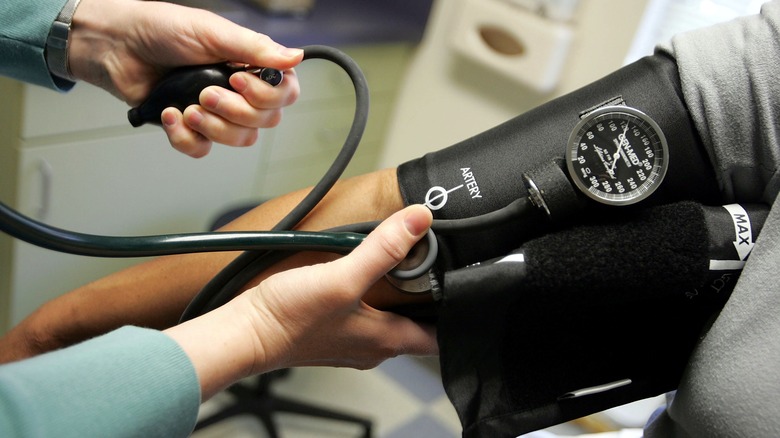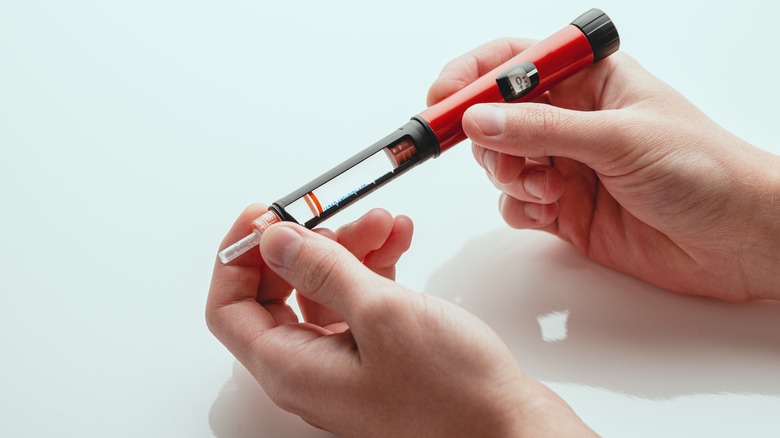What You Can Do To Decrease Your Risk Of Heart Disease
Heart disease seems like it is a tricky condition that is born of a hundred different risk factors. In some capacity, this is kind of true. There are, indeed, a ton of different risk factors. Plus, the term "heart disease" encompasses many different illnesses and complications. Heart disease can include coronary artery disease, arrhythmias, hardened arteries, weakened heart muscles, infections, and more.
According to Healthline, one in every four deaths in the United States is caused by heart disease of some kind. And while heart disease and heart-related complications are so ubiquitous, there is a lot we can do to help decrease our risk.
Your family history, age, gender, and ethnicity are all outside of the realm of what you can control. However, there are a ton of lifestyle choices you can make to help reduce your risk of developing a heart disease-related condition. By taking control of your lifestyle, you can drastically reduce your risk of heart disease — and increase your chances of living a long and healthy life.
Move your body
We are so sorry to tell you that, yet again, exercise is one of the main ways that you can increase your likelihood of health. It seems like exercise and general movement are always at the root of health risk factor reduction, and heart disease is certainly no exception.
The ways in which exercise can help you are vast. Exercise allows you to manage your weight, which is a major risk factor when it comes to heart disease (via Mayo Clinic). Exercising and maintaining a healthy body weight can help reduce your chances of developing other conditions that can set the groundwork for heart disease to emerge. This includes conditions such as diabetes, high blood pressure, and high cholesterol.
While the recommendations are to incorporate 150 minutes of moderate exercise or 75 minutes of vigorous exercise per week, simply starting to move more can have positive effects on your health and reduce your risk of developing heart disease. If you are not in the habit of exercising regularly, the Mayo Clinic recommends starting small and working up to longer bouts of exercise. Even a few moments of movement per day can have extreme benefits for your health.
Quit tobacco products
Aside from exercise, abstaining from tobacco products is one of the things that doctors are constantly telling us to do to preserve our health. Of course, they tell us this with good reason, because of how toxic and damaging the chemicals in the products (and even secondhand smoke) can be.
The chemicals used in the creation of cigarettes can damage your blood vessels and heart, which ultimately leads to less oxygen in your blood (via Mayo Clinic). Our bodies crave oxygen, so inhibiting this function can force our bodies to compensate. This is often accomplished by way of increased blood pressure and heart rate — because our hearts have to work harder than they should to pump freshly oxygenated blood throughout our systems. Yes, even secondhand smoke can negatively affect your blood vessels and heart in this way.
The Mayo Clinic reports that quitting, which we know is easier said than done, is a great way to help diminish your risk of a cardiac event. They state that the benefits start to mount as early as the day after you quit! They go on to state that a year after quitting cigarettes,"the risk of heart disease drops to about half that of a smoker."
Keep your weight in check
Keeping your weight within a healthy range is incredibly important for overall wellness, but it also helps decrease your risk of heart disease. Obesity has been linked to other risk factors for heart disease, such as high cholesterol, high triglyceride levels, and high blood pressure. By ensuring that your weight is within a healthy range, you can limit these complications, which leads to a lowered risk of heart disease (via Medline Plus).
More specifically, people who carry their excess weight around their stomachs (think apple-shaped bodies) are at a higher risk of heart complications without weight management. Much like starting a new exercise routine, losing weight can feel like a daunting task. By taking small steps towards this goal, you can greatly decrease your risk of heart disease. According to the Mayo Clinic, a 3% – 5% decrease in body weight can help lower elevated blood pressure, decrease blood triglycerides, and help with blood sugar regulation.
Eat plenty of healthy foods
It probably comes as no surprise to learn that one of the major ways that you can reduce your risk of heart disease is by eating a healthy diet full of fresh, nutritious foods. As you likely suspect, loading your plate with fruits, veggies, and whole grains is a great place to start.
Beyond that, it is important to be mindful of the quantity and types of fats you are consuming. Ensuring that you are not overly consuming saturated fats, which are most abundant in animal products, is crucial (via Medline Plus). But so is limiting your intake of trans fats, which are arguably worse for your health, and typically come to be as a result of manufacturers changing liquid fats and oils into solid fats (think shortening).
Reducing your sodium intake helps control blood pressure, which as we know has an influence on the health of our tickers. It is best to opt for protein sources that are low in fat, such as eggs, fish, lean ground meats, and skinless poultry. And of course, keeping an eye on your portion size can help you maintain your weight and ensure that you do not overindulge when you enjoy an occasional treat (via Mayo Clinic).
Limit your salt and sugar intake
Two dietary components that deserve special attention when it comes to decreasing your risk of heart disease are salt and sugar. We know, the two best things your taste buds have ever had the pleasure of enjoying, we know. Over-consuming sodium for a long time can have detrimental effects on the health of your heart because of its link to high blood pressure. The toll that high blood pressure takes on your heart is great, mostly because it stiffens and narrows the blood vessels (via Cleveland Clinic). This inhibits the circulation of oxygen, which increases how hard your heart has to work to pump blood through your body (i.e., blood pressure).
The effects that sugar has on the heart are slightly more indirect and still being studied for clarity. Over-indulging on sweet treats can raise your blood pressure, which we know is related to an increased risk of heart disease. Moreover, sugar can increase your systemic inflammation, which increases your risk of heart disease and other health issues that can pave the way to heart disease. Too much sugar can also affect the functionality of your liver, which may turn into fatty liver disease, which can parlay into diabetes, which may lead to an increased risk of heart disease (via Harvard Health).
Check in with your doctor
Checking in with your doctor on a consistent basis is an excellent way to help lower your risk of heart disease. Not only will any changes or increase in risk factors be spotted sooner, but your doctor will be able to prescribe lifestyle changes or medications to help keep you safe and healthy.
Once you consult with your doctor, you can better understand what your baseline blood pressure, heart rate, triglyceride levels, and diabetes risk factors are. Thereafter, if something out of the ordinary arises, you and doctor are more likely to notice it before it can cause too much damage.
The Mayo Clinic recommends starting to screen your blood pressure around the age of 18 and continue every other year. Cholesterol screenings should begin around the age of 20, though this typically only needs to be tested every four to six years. Of course, your doctor might determine that these metrics should be tested more frequently in your body, based on your genetic risk factors and lifestyle.
Don't skimp on sleep
To summarize the basics of heart disease-related risk reduction, we will say this — taking care of your body is key. We see this when it comes to diet, exercise, and other lifestyle factors, but the same goes for rest.
Failing to get adequate rest can affect your overall health, thus increasing your risk of developing heart disease. Specifically, not sleeping enough raises your risk of developing high blood pressure, diabetes, and obesity. As we already know, those three health complications greatly raise your risk of developing heart disease.
Most people thrive when they get seven to nine hours of quality sleep per night. If you struggle to sleep well night after night, contact your doctor. Even though it might seem like tiredness is the main consequence, your body needs rest to stay in tip-top shape. Medline Plus reminds us that even an issue such as sleep apnea can degrade our quality of sleep and therefore increase our risk of developing heart disease. Rest up!
Chill out
Zen masters and yogis, rejoice! You are already on your way to decreasing your risk of heart disease. If you consider yourself to be a tightly-wound person, you should start by chilling out. That sounds aggressive, but hear us out.
Stress can increase your blood pressure, especially if the stress you experience is chronic. Stress has even been considered to be one of the triggers for heart attacks, which is pretty wild when you think about it. Moreover, a lot of stressed-out people do not exactly have the healthiest coping mechanisms. Some of these less-than-desirable ways of dealing include over-eating, binge-drinking, and smoking (via Medline Plus).
To combat this, experts recommend seeking out hobbies that offer a bit a peace. This list includes things like exercise, predictably, meditating, and listening to music. By focusing on taking deep breaths and cultivating presence, you'll find yourself moving through your days with a bit less chaos circulating around you. Ultimately, this can reduce your risk of heart disease in the future.
Keep an eye on your blood pressure
Since elevated blood pressure is one of the main heart disease risk factors, it is pretty logical to think that this is a biometric that we should keep an eye on. The best way to go about measuring this is by visiting your doctor regularly. High blood pressure, also known as hypertension, is especially dangerous because there aren't usually any warning signs or obvious symptoms. However, in the United States, around one in every three adults has high blood pressure (per Medline Plus).
Maintaining a healthy weight and eating a heart-healthy diet are great ways to help regulate your blood pressure. Your ethnicity and family history can play a role in your risk of developing high blood pressure, which is another reason why regularly seeing your doctor is important. Men are more likely to develop hypertension before they are 55 years old, while women are more likely than men to develop it after their 55th birthdays. No matter your gender, monitoring your blood pressure will help you notice if anything goes array and can help you maintain your health for your future.
Regulate your alcohol intake
Overconsuming alcohol can have detrimental effects on your health across the board. Specifically, engaging in overdrinking can increase your risk of developing heart disease, because it increases your blood pressure. Drinking too much alcohol can also increase your overall body weight, which raises your chances of developing other risk factors for heart disease.
This doesn't necessarily mean that you need to avoid happy hours with friends and coworkers forever, but it does mean that keeping an eye on your consumption can help you stay healthier as you age. The current recommendations, as explained by Medline Plus, are as follows: Men should not consume more than two alcoholic beverages per day and women should have no more than one drink daily.
It is valuable to remember that not all cocktails are created equal and many could sneakily spike your sugar intake, which we already know has inflammatory effects throughout our bodies.
Monitor your cholesterol and triglycerides
As established, starting to understand and then measure the inner workings of your body are key components when it comes to evaluating and limiting your risk factors for heart disease. By establishing your baseline levels for blood triglycerides and cholesterol, you'll be better able to quell your development of risk factors.
Cholesterol is one of the main things that causes arterial clogging, which forces your heart to work harder to compensate. In this way, it raises your risk of developing heart disease. Triglycerides are fats that live in your blood. When their levels get elevated, so does your risk of developing heart disease. By monitoring and understanding these two metrics with the help of your doctor, you will be better equipped to take action if your level of either one rises. Notably, high levels of triglycerides tend to have a heftier effect on increasing heart disease risk in women when compared to men (per Medline Plus).
Manage diabetes if you have it
If you have diabetes, managing it properly is absolutely crucial when it comes to living a long, healthy life. Unfortunately, having diabetes is already a major risk factor when it comes to heart disease. They are often tightly linked, but that doesn't mean you cannot take action to help decrease your risks.
If you are correctly managing your diabetes, your blood sugar should remain stable. But if you are struggling to manage your illness, the rollercoaster of blood sugar levels can wreak havoc on your system. Specifically, having chronically high blood sugar can degrade the nerves and blood vessels that surround your heart, as explained by the Centers for Disease Control and Prevention (CDC).
Diabetes increases your chances of developing many of the other heart disease-predicting risk factors. These risk factors include elevated "bad" cholesterol, elevated blood triglycerides, obesity, and high blood pressure. By working with your doctor to manage diabetes (if you have it), you will be better able to ward off further risk factors of heart disease.
Educate yourself about your family history
Just like monitoring your health with your doctor can ultimately help reduce your risk of heart disease, educating yourself about your family's history can help, too.
Family history is not exactly something we can control, but by knowing what (if any) incidences of heart disease have befallen our relatives, our doctors can help us establish what our individual risks might be. If you have a family history of heart attacks, your doctor will likely encourage you to begin a treatment plan to help lessen your risk.
The American Heart Association even has a tool on their website to help you calculate your risk. They recommend that anyone between the ages of 40 and 75 who has not had a heart attack or stroke utilize this tool to determine their risk. By arming yourself with this knowledge, you'll be better able to confront whatever conditions life throws your way.
Take medications as directed
Establishing proper care with your doctor is key, but so is following through with the treatment plans they provide for you.
If your doctor prescribes medications, it is in your best interest to take them as instructed. This is especially true if your medications are prescribed to help manage symptoms that could spiral into huge risk factors and predictors of heart disease (per The American Heart Association). Failing to take medications as directed can greatly increase your risk of developing irreversible damage to your heart and surrounding tissues.
The American Heart Association reminds us that while taking a low dose of aspirin is recommended by doctors in some cases, it might degrade your health if you are not instructed to do so by a medical professional. When in doubt, visit your doctor and follow their treatment plans as closely as you can to lessen your risk of heart-related complications in your future.















